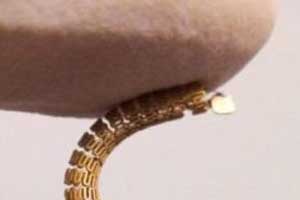- Home
- Editorial
- News
- Practice Guidelines
- Anesthesiology Guidelines
- Cancer Guidelines
- Cardiac Sciences Guidelines
- Critical Care Guidelines
- Dentistry Guidelines
- Dermatology Guidelines
- Diabetes and Endo Guidelines
- Diagnostics Guidelines
- ENT Guidelines
- Featured Practice Guidelines
- Gastroenterology Guidelines
- Geriatrics Guidelines
- Medicine Guidelines
- Nephrology Guidelines
- Neurosciences Guidelines
- Obs and Gynae Guidelines
- Ophthalmology Guidelines
- Orthopaedics Guidelines
- Paediatrics Guidelines
- Psychiatry Guidelines
- Pulmonology Guidelines
- Radiology Guidelines
- Surgery Guidelines
- Urology Guidelines
Can we improve on the existing Drug eluting stents (DES)?

Since, the introduction of bare metal stents an enormous amount of research, innovation, and expenditure has gone into the development of stents. Today, expectantly the development of a new DES platform costs around 250millon USD The cost of DES has been decreasing >5% on yearly basis across the world and in our country it has decreased by >75-90%. This has resulted in blunting the enthusiasm of the industry to develop a novel DES [drug eluting stent] suiting to the ideal coronary requirements.
The improvement in the stent element can be in
(a) antiproliferative drug
(b) in the polymer
(c) in the stent composition or design
(d) in stent delivery system.
DRUG
It is a fact that there lies an enormous opportunity for an improved version of the antiproliferative drug for improved smooth muscle cell (SMC) inhibition but there are challenges of the research authentication cost and regulatory requirements.
Among the sirolimus analogs, which have been proved beyond doubt as a method of the SMC inhibition there are definite differences in the various chemicals in the toxicity, efficacy, and outcome. And still, there is an opportunity for further development in the process and procedure of the drug application to the arterial wall.
It is known that though a very small percentage of an eluted drug is actually distributed to vessel wall which is adversely impacting smooth muscle inhibition. But will be ideal if we maintain a constant therapeutic, nontoxic, concentration of the drug concentration in the vessel wall causing no slowing down or burst of distributing by an exponential increase or decrease.
Polymer
There can be a good polymer or bad polymer in the form of, degradable and durable polymer no polymer. The polymer has been found related to increasing the inflammatory environment and impacting the incidence of stent thrombosis. Actually, every polymer is degradable in some fashion whether in response to the hemodynamic stress or to the interaction with drug elution. Recently, a crystalline drug has been introduced in certain 3rd generation stent platforms which outlives the duration of polymer absorption and blocking any inflammatory response to the polymer.
Stent Composition
The cobalt, chromium has been found to be acceptable metal for its radial strength and no elastic recoil but probably additional metals may even need to be introduced to add to the strength with thinner strut thicknesses. Better stents with more radio-opacity, fatigue resistance and corrosion have to be introduced in the near future
Lately, a lot of interest has been generated about strut thickness. The strut thickness is relevant but may be an oversimplification because struts are not unidimensional and apart from thickness, the width also has to be taken into account. However, with ultrathin struts stent, there is a need to understand the impact of narrow struts and ultra narrow width struts. The strut numbers and strut design integrating with the total strut design should be the principal focus to enhance the deliverability and confirmability.
Lesion-specific Design
Tapered stents, bioresorbable connectors adaptive remodeling and restoration of pulsatility, or specially designed bifurcation stents can add to the various properties of stent implantation. The stent delivery system also needs to be further developed and the stent has to be designed to facilitate delivery in challenging anatomy as well as differentially expanding to suit to varying sizes of vessel
Although there has been an enormous development in all directions of stent development, Since last so many years, yet a new direction is required so that the stent can be lesion-specific, site-specific and patient-specific and safe and efficacious for the purpose it is used.

Disclaimer: This site is primarily intended for healthcare professionals. Any content/information on this website does not replace the advice of medical and/or health professionals and should not be construed as medical/diagnostic advice/endorsement or prescription. Use of this site is subject to our terms of use, privacy policy, advertisement policy. © 2020 Minerva Medical Treatment Pvt Ltd